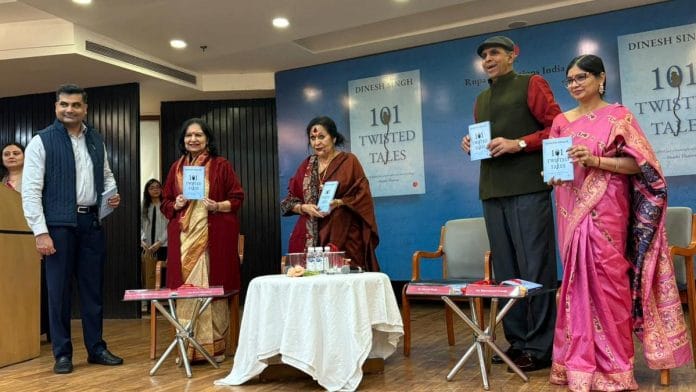New Delhi: When his daughter installed X on his phone, noted educationist and mathematician Dinesh Singh had no idea what to do with it. He started tweeting short, witty stories of 40-50 words each. These little tales quickly struck a chord with readers and caught the attention of Shashi Tharoor. One day, Tharoor called him, urging him to pause tweeting and turn the posts into a book.
“Shashi called me and said, ‘I really like what you’re writing’. I said, ‘I’ll do this only if you write the foreword for my book.’ And he took the time to write a foreword, calling it the antithesis of my short picture stories,” said Singh, currently chancellor of KR Mangalam University and former vice-chancellor of Delhi University.
And that’s how Singh’s journey into authorship began.
A room full of friends, family, and academics gathered at the India International Centre in New Delhi on November 11 at the launch of 101 Twisted Tales. The event featured Padma Vibhushan awardee and classical dancer Sonal Mansingh as chief guest, along with Malashri Lal, executive board member of the Sahitya Akademi, and Bijayalaxmi Nanda, principal of Miranda House, as guests of honour.
The book is a collection of short and inventive stories drawn from his lifetime of observations, small coincidences, and reflections. Using wit, empathy, and precise storytelling, his short stories capture everything from Gandhi’s lessons to celebrity tales.
“It’s very difficult to put big thoughts into words. By nature, I think we Indians love to talk. And we’re very good at constructing stories out of nothing. But to reduce it to just a few sentences, in that way, they become like puzzles. If you don’t read the last sentence or the last word, you keep wondering. It’s like a mathematical formula. A theorem. So I think that mathematician in you did this,” said Mansingh, looking at Singh.
Also Read: ‘Was Bhagat Singh only a nationalist?’ Irfan Habib reframes the icon
Tiny tales, big punch
Singh’s tales defy existing genres, according to Lal. And that he has invented a new style of storytelling.
“I was discussing this with a friend who mentioned flash fiction. Naturally, I jumped to Dinesh’s defence and said, no, flash fiction usually runs between a thousand and fifteen hundred words—this is far shorter. This is a Twitter [now X] story. And it’s in this space that we find those beautiful vignettes on such a wide range of subjects,” said Lal.
Singh’s stories are mischievous, sharp, and funny. He goes for the twist, the jolt of recognition for the reader.
“Each day, I adorn myself and caress you with my eyes. But you spurn me. [She] smiles at you and you make her happy. Why do you not see the yearning in my eyes? Lie to me just once, oh mirror,” reads one tale in the book.
Human foibles, humour, and pithy insights that linger are the common thread.
Also Read: Pets join launch of book on author’s train journeys with her dogs
History in a nutshell
Singh has long been devoted to MK Gandhi, especially his ideas on education and his simplicity. Lal recalled how, as vice-chancellor of DU, Singh once took a thousand students and teachers to Sabarmati for a few days so they could experience Gandhian values and understand what Satyagraha meant as a national movement.
In his book, Singh has distilled his admiration into emotive, slightly cryptic vignettes.
One goes: “The foreign-returned man asked in a reprimanding tone, ‘Why do you not wash your saree today?’ The woman replied with anger, ‘What shall I wear when it is washed?’ The man, moved by compassion, forsook his upper garment.”
This story wasn’t a flight of the imagination. Singh explained that during his Champaran days, Gandhi was deeply moved by the plight of impoverished women who had only a single garment and could not wash it. Confronted with such deprivation, he acted from empathy. If your own brothers and sisters have no clothes, how can you enjoy your own? In that spirit, he stopped wearing an upper garment.
“My family had a personal connection—during his later visits, Gandhiji stayed at my wife’s ancestral home with my grandfather, spending several days there, along with Meera Ben,” Singh said.
Over the years, hearing these stories seeped into his consciousness.
The book also includes a story about Indira Gandhi. A sage reportedly warned her that one of her sons might face a political assassination and the other could die in an air crash. So she discouraged Rajiv from becoming a pilot and Sanjay from entering politics. The irony is devastating.
Some stories are about film stars, where readers can spot a favourite actor or sometimes have to guess who they are.
“These are powerful stories, and only with your mathematical precision could they be told in so few words,” said Lakshmi.
(Edited by Asavari Singh)






